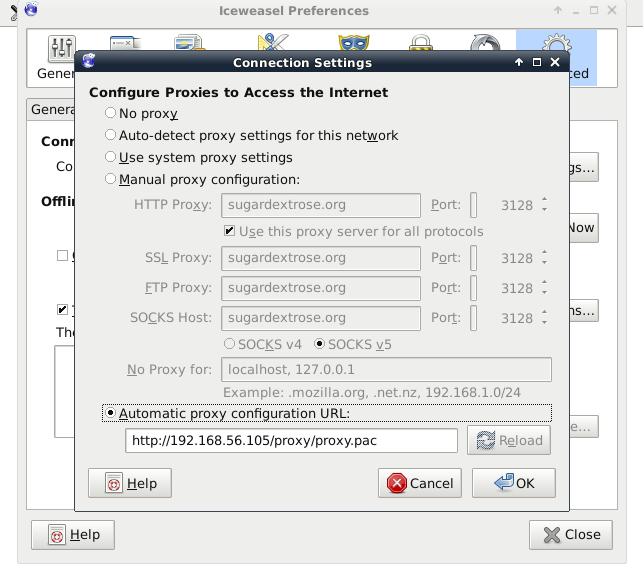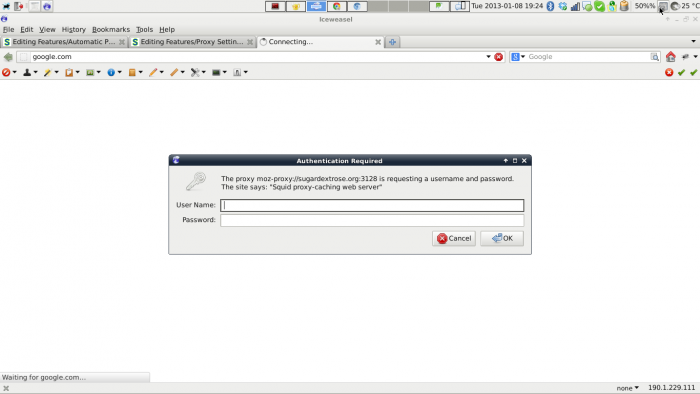Features/Automatic Proxy Settings: Difference between revisions
| (9 intermediate revisions by the same user not shown) | |||
| Line 21: | Line 21: | ||
(PAC and WPAD) for testing purposes. | (PAC and WPAD) for testing purposes. | ||
For testing a proxy in XO you can go to: [http://wiki.sugarlabs.org/go/Features/Proxy_Settings Features/Proxy Settings] | For testing a proxy in XO you can go to: [http://wiki.sugarlabs.org/go/Features/Proxy_Settings#How_To_Test Features/Proxy Settings] | ||
== Benefit to Sugar == | == Benefit to Sugar == | ||
| Line 35: | Line 35: | ||
PAC method for proxy is very simple. You have to create a web-accessible | PAC method for proxy is very simple. You have to create a web-accessible | ||
file with special syntax in which you include proxy server data. This example | file with special syntax in which you include proxy server data. This example | ||
works with Apache server. You can take a look to [http://wiki.sugarlabs.org/go/Features/Automatic_Proxy_Settings# | works with Apache server. You can take a look to [http://wiki.sugarlabs.org/go/Features/Automatic_Proxy_Settings#Bibliography Bibliograpy] | ||
for | for more info about PAC file configuration and installation in other webservers. | ||
Steps: | Steps: | ||
* Create .htaccess file and | * Install httpd web server: | ||
yum install httpd | |||
* Enable configuration override with htaccess | |||
vim /etc/httpd/conf/httpd.conf | |||
<Directory "/var/www/html"> | |||
... | |||
# | |||
# AllowOverride controls what directives may be placed in .htaccess files. | |||
# It can be "All", "None", or any combination of the keywords: | |||
# Options FileInfo AuthConfig Limit | |||
# | |||
AllowOverride None | |||
... | |||
</Directory> | |||
Replace the line "AllowOverride None" with "AllowOverride All" | |||
* Create a web enabled directory proxy | |||
mkdir /var/www/html/proxy | |||
* Create .htaccess file and the following content: | |||
vim /var/www/html/proxy/.htaccess | |||
AddType application/x-ns-proxy-autoconfig .pac | AddType application/x-ns-proxy-autoconfig .pac | ||
* Create PAC file and add the following content: | * Create PAC file and add the following content: | ||
vim /var/www/html/proxy/proxy.pac | |||
function FindProxyForURL(url, host) { | function FindProxyForURL(url, host) { | ||
| Line 50: | Line 77: | ||
} | } | ||
* | * Set permissions for the directory proxy | ||
chown -R apache.apache /var/www/html/proxy | |||
chmod -R 755 /var/www/html/proxy | |||
* Restart httpd web server | |||
service httpd restart | |||
* | * Test in your favorite browser | ||
[[File:testproxyiceweasel-1.png]] | |||
[[File:testproxyiceweasel-2.png|700px]] | |||
== WPAD - Web Proxy Autodiscovery == | == WPAD - Web Proxy Autodiscovery == | ||
Web Proxy Auto-Discovery Protocol, or WPAD, is a technology which aids a web browser in automatically detecting the location of a PAC file using DNS or DHCP. | |||
A browser that supports both DHCP and DNS will first attempt to locate a PAC file using DHCP, and should a DHCP configuration not exist fail-over to DNS WPAD will occur. If neither are configured, a browser will fail open. [http://findproxyforurl.com/ Source] | |||
== Bibliography == | == Bibliography == | ||
Latest revision as of 19:28, 8 January 2013
Summary
Allow the user to setup transparent Proxy service.
Owner
Current status
- Targeted release: 0.98
- Last updated: 2013-01-07
- Percentage of completion: 80%
Detailed Description
Sugar deployments and users need to be able to set a proxy to access some network services.
In this entry you can learn a way of configuring automatic proxy server (PAC and WPAD) for testing purposes.
For testing a proxy in XO you can go to: Features/Proxy Settings
Benefit to Sugar
See Detailed Description.
Scope
It's not directly related to XO, it's just a part for building an environment for automatic proxy testing in XO
PAC - Proxy Auto Config
PAC method for proxy is very simple. You have to create a web-accessible file with special syntax in which you include proxy server data. This example works with Apache server. You can take a look to Bibliograpy for more info about PAC file configuration and installation in other webservers.
Steps:
- Install httpd web server:
yum install httpd
- Enable configuration override with htaccess
vim /etc/httpd/conf/httpd.conf <Directory "/var/www/html"> ... # # AllowOverride controls what directives may be placed in .htaccess files. # It can be "All", "None", or any combination of the keywords: # Options FileInfo AuthConfig Limit # AllowOverride None ... </Directory> Replace the line "AllowOverride None" with "AllowOverride All"
- Create a web enabled directory proxy
mkdir /var/www/html/proxy
- Create .htaccess file and the following content:
vim /var/www/html/proxy/.htaccess
AddType application/x-ns-proxy-autoconfig .pac
- Create PAC file and add the following content:
vim /var/www/html/proxy/proxy.pac
function FindProxyForURL(url, host) {
return "PROXY PROXY_SERVER_IP_OR_HOSTNAME:PORT";
}
- Set permissions for the directory proxy
chown -R apache.apache /var/www/html/proxy chmod -R 755 /var/www/html/proxy
- Restart httpd web server
service httpd restart
- Test in your favorite browser
WPAD - Web Proxy Autodiscovery
Web Proxy Auto-Discovery Protocol, or WPAD, is a technology which aids a web browser in automatically detecting the location of a PAC file using DNS or DHCP.
A browser that supports both DHCP and DNS will first attempt to locate a PAC file using DHCP, and should a DHCP configuration not exist fail-over to DNS WPAD will occur. If neither are configured, a browser will fail open. Source

